Windows on ARM may refer to:
- Windows RT, a deprecated ARM32 version of Windows 8/8.1
- Windows 10 on ARM, Windows 10 compiled for ARM64 devices
- Windows 11 on ARM, Windows 11 compiled for ARM64 devices
Windows on ARM may refer to:

In electronics and computer science, a reduced instruction set computer (RISC) is a computer architecture designed to simplify the individual instructions given to the computer to accomplish tasks. Compared to the instructions given to a complex instruction set computer (CISC), a RISC computer might require more instructions in order to accomplish a task because the individual instructions are written in simpler code. The goal is to offset the need to process more instructions by increasing the speed of each instruction, in particular by implementing an instruction pipeline, which may be simpler to achieve given simpler instructions.
ARM is a family of RISC instruction set architectures (ISAs) for computer processors. Arm Ltd. develops the ISAs and licenses them to other companies, who build the physical devices that use the instruction set. It also designs and licenses cores that implement these ISAs.
The Portable Executable (PE) format is a file format for executables, object code, DLLs and others used in 32-bit and 64-bit versions of Windows operating systems, and in UEFI environments. The PE format is a data structure that encapsulates the information necessary for the Windows OS loader to manage the wrapped executable code. This includes dynamic library references for linking, API export and import tables, resource management data and thread-local storage (TLS) data. On NT operating systems, the PE format is used for EXE, DLL, SYS, MUI and other file types. The Unified Extensible Firmware Interface (UEFI) specification states that PE is the standard executable format in EFI environments.
In computing, cross-platform software is computer software that is designed to work in several computing platforms. Some cross-platform software requires a separate build for each platform, but some can be directly run on any platform without special preparation, being written in an interpreted language or compiled to portable bytecode for which the interpreters or run-time packages are common or standard components of all supported platforms.
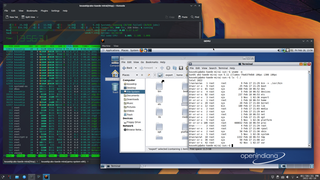
QEMU is a free and open-source emulator. It emulates a computer's processor through dynamic binary translation and provides a set of different hardware and device models for the machine, enabling it to run a variety of guest operating systems. It can interoperate with Kernel-based Virtual Machine (KVM) to run virtual machines at near-native speed. QEMU can also do emulation for user-level processes, allowing applications compiled for one processor architecture to run on another.
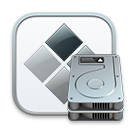
Boot Camp Assistant is a multi boot utility included with Apple Inc.'s macOS that assists users in installing Microsoft Windows operating systems on Intel-based Macintosh computers. The utility guides users through non-destructive disk partitioning of their hard disk drive or solid-state drive and installation of Windows device drivers for the Apple hardware. The utility also installs a Windows Control Panel applet for selecting the default boot operating system.
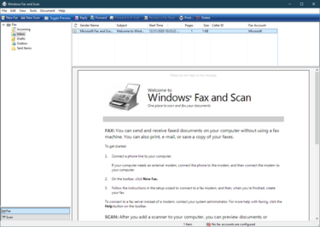
Windows Fax and Scan is an integrated faxing and scanning application introduced in Windows Vista and included in the Business, Enterprise, and Ultimate Windows Vista editions as the replacement for the Fax Console of Windows XP; it is available in all versions of Windows 7, Windows 8, Windows 10 (x86/x64) and Windows 11 (x64), but not on ARM64 versions of Windows 10 and Windows 11.
Microsoft Windows is the name of several families of computer software operating systems created by Microsoft. Microsoft first introduced an operating environment named Windows in November 1985 as an add-on to MS-DOS in response to the growing interest in graphical user interfaces (GUIs).

ELinOS is a commercial development environment for embedded Linux. It consists of a Linux distribution for the target embedded system and development tools for a development host computer. The development host computer usually is a standard desktop computer running Linux or Windows. The Linux system and the application software for the target device are both created on the development host.
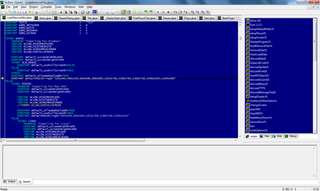
GLBasic is a commercial BASIC programming language that can compile to various platforms including Windows, Linux, Mac OS X, and some handheld devices. The language is designed to be simple and intuitive.
The Android Package with the file extension apk is the file format used by the Android operating system, and a number of other Android-based operating systems for distribution and installation of mobile apps, mobile games and middleware. A file using this format can be built from source code written in either Java or Kotlin.
In computing on Microsoft platforms, WoW64 is a subsystem of the Windows operating system capable of running 32-bit applications on 64-bit Windows. It is included in all 64-bit versions of Windows, except in Windows Server Server Core where it is an optional component, and Windows Nano Server where it is not included. WoW64 aims to take care of many of the differences between 32-bit Windows and 64-bit Windows, particularly involving structural changes to Windows itself.

Windows RT is a mobile operating system developed by Microsoft. It is a version of Windows 8 or Windows 8.1 built for the 32-bit ARM architecture (ARMv7). First unveiled in January 2011 at Consumer Electronics Show, the Windows RT 8 operating system was officially launched alongside Windows 8 on October 26, 2012, with the release of three Windows RT-based devices, including Microsoft's original Surface tablet. Unlike Windows 8, Windows RT is only available as preloaded software on devices specifically designed for the operating system by original equipment manufacturers (OEMs).

Microsoft Surface is a series of touchscreen-based personal computers, tablets, and interactive whiteboards designed and developed by Microsoft, most of them running the Windows operating system. They are designed to be premium devices that set examples for manufacturers of other Windows-compatible products. It comprises several generations of hybrid tablets, 2-in-1 detachable notebooks, a convertible desktop all-in-one, an interactive whiteboard, and various accessories, many with unique form factors. The majority of devices in the Surface lineup are based on Intel processors and compatible with Windows 10 or Windows 11.

The Surface Pro X is a 2-in-1 detachable tablet computer developed by Microsoft. It was developed alongside and was announced on 2 October 2019 alongside the Surface Pro 7 and Surface Laptop 3. Updated hardware was announced alongside Surface Laptop Go and Surface accessories on October 1, 2020 and September 22, 2021. The device starts at $899.99 USD / £849.99.
Box86 is an emulator for x86 userspace tools on ARM Linux systems, allowing such systems to execute video games and other programs that have been compiled for x86 Linux systems. Box86 is an alternative to QEMU for user-mode emulation. Box86 also provides dynamic recompilation as well as functionality to intercept dynamic library calls and forward them to equivalent native libraries, allowing applications to run significantly faster than if they were fully emulated.
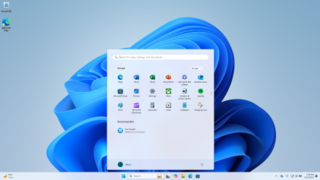
Windows 11 is the latest major release of Microsoft's Windows NT operating system, released on October 5, 2021. It succeeded Windows 10 (2015) and is available for free for any Windows 10 devices that meet the new Windows 11 system requirements.
Windows 11 is the current major release of Microsoft's Windows NT operating system. Released on October 5, 2021, Windows 11 succeeds the previous major release, Windows 10.